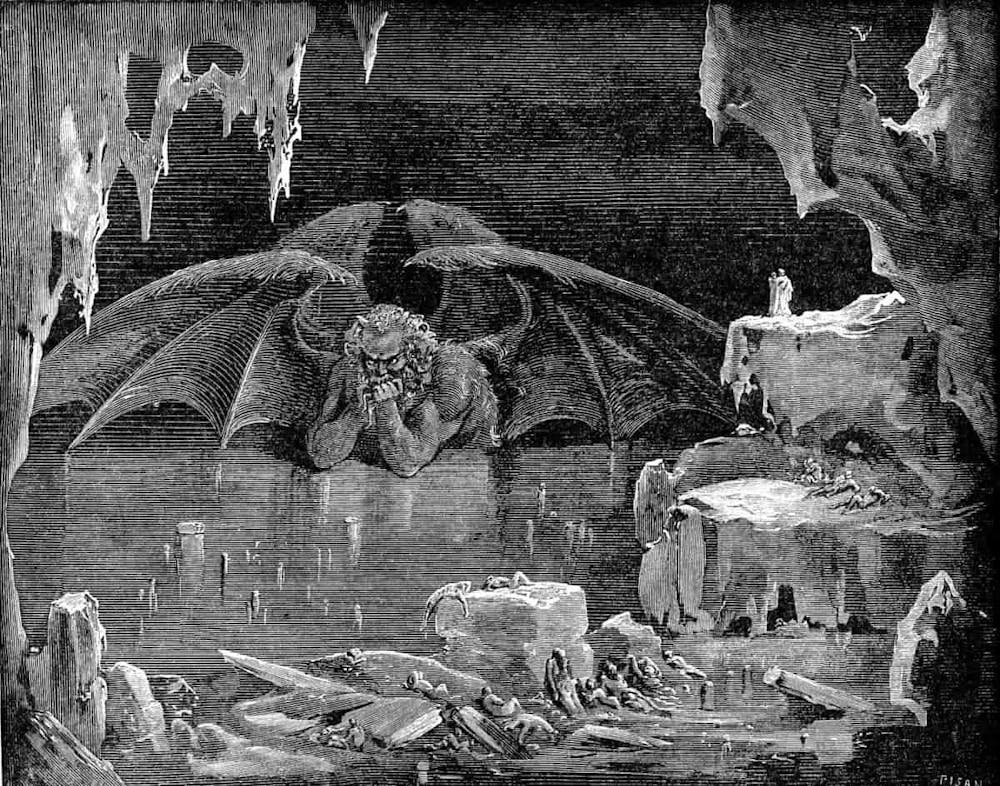Dante Alighieri's Divine Comedy is undeniably a timeless classic. Its grand adventure through the nine gates of hell sparks readers with life and interest. It seems like an out-of-place work for a description of our chaotic times, but I believe it is a lot more relatable to us than we might think in the most unlikely of ways. So what can readers take from this classic besides grand allusions to the past?
Perhaps it is with the old that we can come to better understand the new. Perhaps we can come to a new perspective on the world and its isolated communication due to COVID-19 through this classic. Much like we are now, venturing alone except through the cyberways of technological communication or daily filial visits, Dante with his guide Virgil treaded a path of darkness to the center of hell to understand and experience the dark side of the world. We too traverse a pathway of “hell” — not a literal one, of course, but rather a figurative pathway of undiscovered and problematic turmoil for the human condition.
For some of us we've come to experience a deep pain from the loss of our loved ones or their suffering due to the harsh effects of COVID-19. Some, if not all of us, have come to experience a depression in one way or another: no more visits to skateparks to perform tricks with our boards; no more restaurants to eat our favorite carne asada tacos, bacon cheeseburgers or chili-cheese french fries; and no more people to hangout with because of the absence of parties, talking and just living normally.
This is not an accurate depiction of our reality. Some would say, though, that we have technology to keep our minds occupied or even solve our problems. Who says that we cannot skate in our backyards, have our food delivered to our homes or visit friends through some online service? Obviously that is the case, and while it is true, I will say that there is still much to learn about our current struggles from the Divine Comedy.
When Dante left with Virgil, who was to say that he could ever get safely through his journey? Who's to say that our phones and Zoom will guarantee our safety and thus our satisfaction from this realm of isolation we have been forced to immerse ourselves in? There are striking moments of peril throughout Dante's journey during which we are left to wonder if his fate is to be trapped in hell for eternity; in a way, this sense of entrapment mirrors our own reality.
While I stare at my screen to watch a movie, to be entertained or distracted, I cannot help but wonder what demons of laziness, of greed, of desire are just waiting to keep me locked into this habit, this dreadful routine. When our journey is assumed to be over with the creation of the vaccine and opening countries back up, some of us may find ourselves trapped and still stuck in this cyberworld. It may come as a never-ending habitual response to our interaction with communities. How will society break out of this one? It’s a haunting question.
Despite the tense state of affairs in Dante's Inferno, I believe there is also a scene in this epic that can possibly relieve us of our own form of Dante's peril, and it is in his encounter with the devil himself. In the presence of the iconic three-faced nightmarish creature, Dante is hesitant and frozen with fear, but it is Virgil, his guide, that breaks his paralysis as they both escape from hell to head onwards to their journey's end.
The devil for us comes in many forms besides a grand picture of evil. It could be the next video we click on when we say "just five minutes more" to our parents and friends, or a game we choose to play hours on end from dawn to night, the addiction that we thought to be an illusion — the devil we've heard of but never believed could exist that traps us there in his gaze. In other words, the devil can be our own addiction to technology that traps us, changes us and potentially destroys us because we lose a sense of importance for the time we should be spending with our friends, our family, our material and natural elements of the world. The danger is there, and it is real.
But Virgil will always be there too as our guide on our path back to life. We know that we have school, friends and a world to come back to. We can derive from this moment of Dante's paralysis an echo of assurance that our guide — our devices — may free us from this techno-paralysis because it is precisely through them that we can remind ourselves that the real world is waiting for us. Maybe then we can have the opportunity to re-emerge into the world not necessarily unscathed, but experienced enough to not go back and inevitably become trapped in the cyber world.
When normalcy returns and everyone goes back to their daily routine, will things be different? Certainly some people will have become more reliant on technology, while others may revert back to their routine. However in the general view of the population I am left to wonder if they will heed the words of Virgil or continue to stare in the eyes of the devil.





